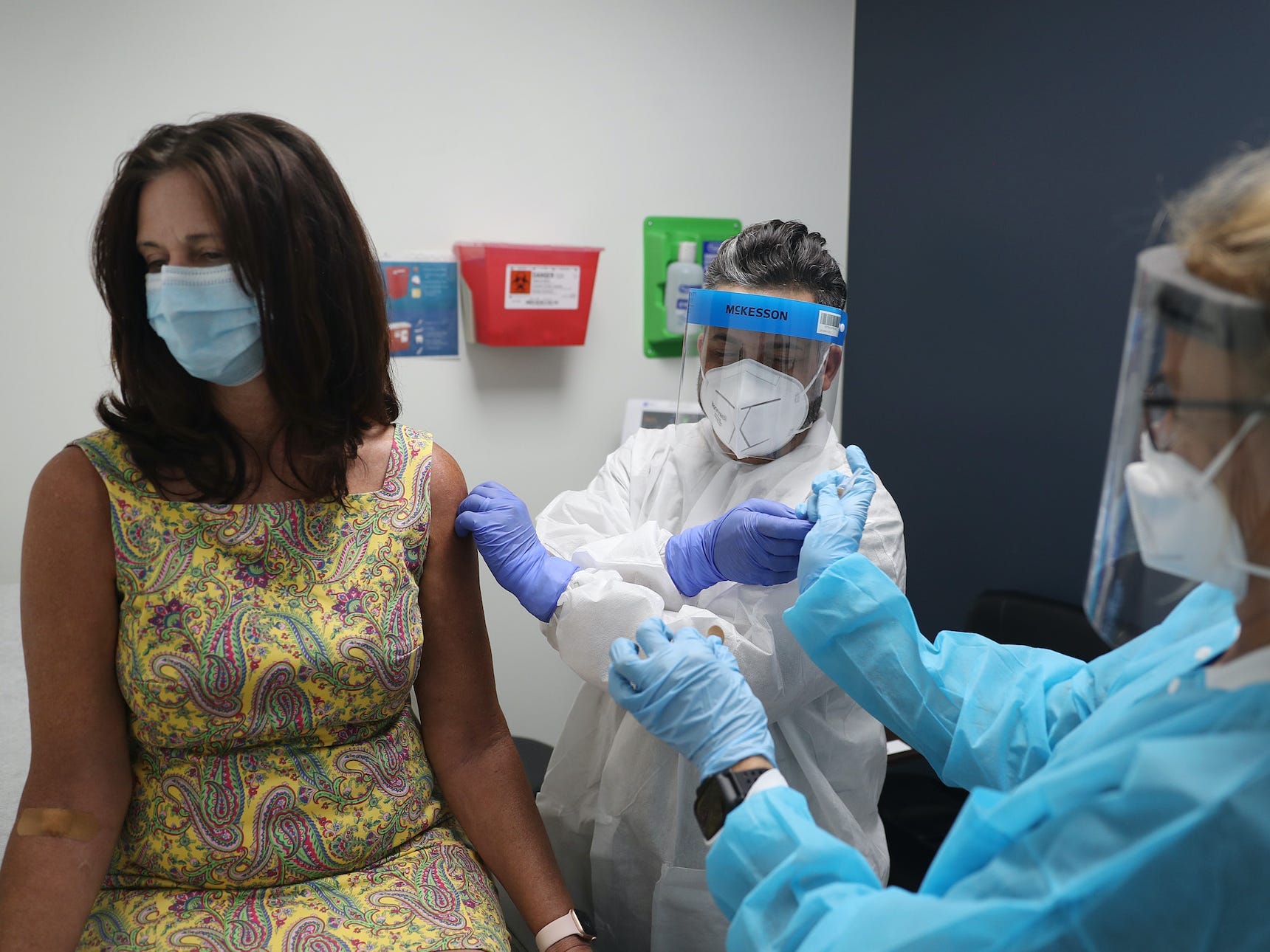
Joe Raedle/Getty Images
- The CDC’s Advisory Committee on Immunization Practices voted on Tuesday to recommend that healthcare workers and long-term care facility residents should receive a coronavirus vaccine first.
- Vaccinating healthcare workers first would allow them to continue to respond to the pandemic.
- Those living in nursing homes and assisted living facilities have experienced high rates of COVID-19 cases and deaths.
- ACIP’s recommendation will help the government decide who gets the first doses of a vaccine once it is authorized.
- For more stories like this, sign up here for Business Insider’s daily healthcare newsletter.
Healthcare personnel and long-term care facility residents should be the first to receive a coronavirus vaccine, the CDC’s Advisory Committee on Immunization Practices said in a meeting on Tuesday.
The committee of medical and public health experts voted 13-1 to allocate initial supplies for vaccinating these two high-risk populations. Despite this recommendation, it is ultimately up to state governments to decide how the vaccine will be distributed.
By providing care to those infected, healthcare workers are at a high risk of coming into contact with the coronavirus, getting sick with COVID-19, and spreading it to others. ACIP’s members and representatives were overwhelmingly in favor of providing the first doses of the vaccine to healthcare personnel, which includes physicians, nurses, technicians, EMTs, pharmacists, and anyone else who may be exposed in a healthcare setting.
Frontline healthcare workers could get their first shots as soon as mid-December, Business Insider’s Aria Bendix reported.
A Food and Drug Administration advisory committee is scheduled to review Pfizer’s emergency use authorization request December 10. If the FDA greenlights the authorization, Americans could start receiving shots 24-48 hours later, and ACIP’s recommendation will help determine who is first in line.
Those who live and work in skilled nursing and assisted living facilities should also have priority, according to the ACIP decision. As of November 24, long-term care facility residents and staff made up 6% of the country's COVID-19 cases and 40% of deaths, per Kaiser Family Foundation data.
Som ACIP members questioned whether long-term care facility residents should be included in the first phase of rollout. Keipp Talbot, ACIP member and associate professor of medicine at Vanderbilt University, expressed concern about how older adults will react to the vaccine and whether it will be effective, given the limited clinical trial data for that age group. Talbot voted against the recommendation.
"We have traditionally tried a vaccine in a young healthy population and then hoped it works in our frail, older adults," Talbot said in the meeting. "That concerns me on many levels, particularly for this vaccine."
Talbot added that prioritizing workers in long-term care facilities rather than residents could have a greater impact on those communities, as demonstrated with influenza vaccines in past years.
Within healthcare settings and long-term care facilities, there may be a need to initially prioritize certain subgroups, CDC officer Sara Oliver said in the meeting. About 40 million doses of the vaccine will be available by the end of December, but they won't be accessible all at once.
"We anticipate five to 10 million doses per week post-authorization, which could lead to a need for sub-prioritization of the initial populations, at least for the first several weeks," Oliver said.
Healthcare workers who have direct contact with patients and are unable to telework are recommended to get first priority, as well as those working in long-term care facilities where residents and staff can get vaccinated at the same time. Skilled nursing facilities, which serve the most medically vulnerable elderly, should also be considered before other long-term care settings.
Oliver also noted that people who have had COVID-19 are unlikely to be reinfected within 90 days after their first symptoms, so people who have not recently been infected should come first. However, ACIP does not recommend testing for antibodies prior to vaccination.
Other groups that could be prioritized in the early phases of vaccine rollout are essential workers who do not work in healthcare settings — such as teachers, food service workers, and first responders — those with high-risk medical conditions, and adults aged 65 and older. Per ACIP's previous discussions, those groups could make up phases 1b and 1c of vaccine distribution.
Dr. Celine Gounder, a member of President-elect Joe Biden's COVID-19 advisory board, told CNN on Friday that the Biden administration plans to heed the advice of public health experts and scientists when it comes to prioritizing who should get a vaccine first.
Dit artikel is oorspronkelijk verschenen op z24.nl

